New from Universe 2019: GitHub for mobile, GitHub Archive Program, and more
It’s our favorite time of year: GitHub Universe. And we’ve made some exciting announcements. GitHub Actions and Packages are now out of beta, we launched GitHub for mobile, redesigned the notifications experience, and introduced lots of other features we think you’ll love.

It’s our favorite time of year: GitHub Universe gives us all two days to celebrate 40+ million developers and their contributions to the open source community. In the past year alone, over 10 million developers have joined from nearly three million organizations in over 70 countries. We also made several exciting announcements. GitHub Actions and Packages are now out of beta, we launched GitHub for mobile, redesigned the notifications experience, created a program to preserve the world’s code for the next 1,000 years, introduced GitHub Security Lab, and announced lots of other features we think you’ll love.
Explore announcements we made on day two of Universe for our work on secure development and community momentum for automating workflows with contributions to GitHub Actions and Packages.
Your Universe TL;DR
Automate your workflows, from code to cloud
Improve your daily experience
- GitHub for mobile
- Notifications
- Code navigation
- Code search
- Code review assignment
- Scheduled reminders
- Feature preview
Secure your public repositories for a thousand years
Help us secure the world’s code
Support even more open source projects
Get the latest GitHub Enterprise Server release
Explore more open source security announcements
- GitHub Security Advisories ↗
- Automated security updates ↗
- New token scanning partners ↗
- GitHub Advisory Database ↗
Automate your workflows, from code to cloud
GitHub Actions, now out of beta
At Universe 2018, we launched GitHub Actions in beta, a community-led approach to software automation. Your feedback has helped shape Actions into the new standard for communities to build and share automation for software development, including a full CI/CD solution and native package management.
Today, we’re announcing the general availability of Actions and celebrating the amazing contributions developed by members of the community including AWS, Google, HashiCorp, Twilio, and many others. There are now over 1,200 community-developed workflows available in GitHub Marketplace, and this list is growing fast.
We also announced the general availability of self-hosted runners, artifact caching, and the ability to run Actions on ARM-based architectures like Raspberry Pi.
Learn more about GitHub Actions
Explore some of our favorite community-created Actions
GitHub Packages, now out of beta
In May, we introduced GitHub Packages (formerly GitHub Package Registry), the best way to combine your source code and packages in one place with integrated permissions management and billing. Packages hosted on GitHub include details and download statistics, along with their entire history. Since introducing the GitHub Packages beta, over 30,000 unique packages have been uploaded, serving the needs of over 10,000 organizations.
We listened to your feedback during the beta and added proxy support for the primary NPM registry, support for using the GitHub Actions token, and many other improvements.
Learn more about GitHub Packages
From code to cloud, with GitHub Actions and Packages
We’ve made GitHub Actions and Packages a part of every developer account with included minutes, storage, and data transfer—and it’s free for all public repositories. You can use Actions to automatically publish new package versions to GitHub Packages, trigger package installs with Actions, and install packages and images hosted on GitHub Packages or your preferred registry of record with minimal configurations. Use the same GITHUB_TOKEN for all automated package uploads and downloads through Actions.
Learn more about automation on GitHub
Improve your daily experience
GitHub for mobile (beta)
GitHub for mobile gives you the flexibility to move work forward and stay in touch with your team, wherever you are. There’s a lot you can do on GitHub that doesn’t require a complex development environment, like sharing feedback on a design discussion and reviewing a few lines of code. Now we are making these tasks easy for you to perform, no matter where you work, with a beautifully native experience.
Review code and merge changes from anywhere.
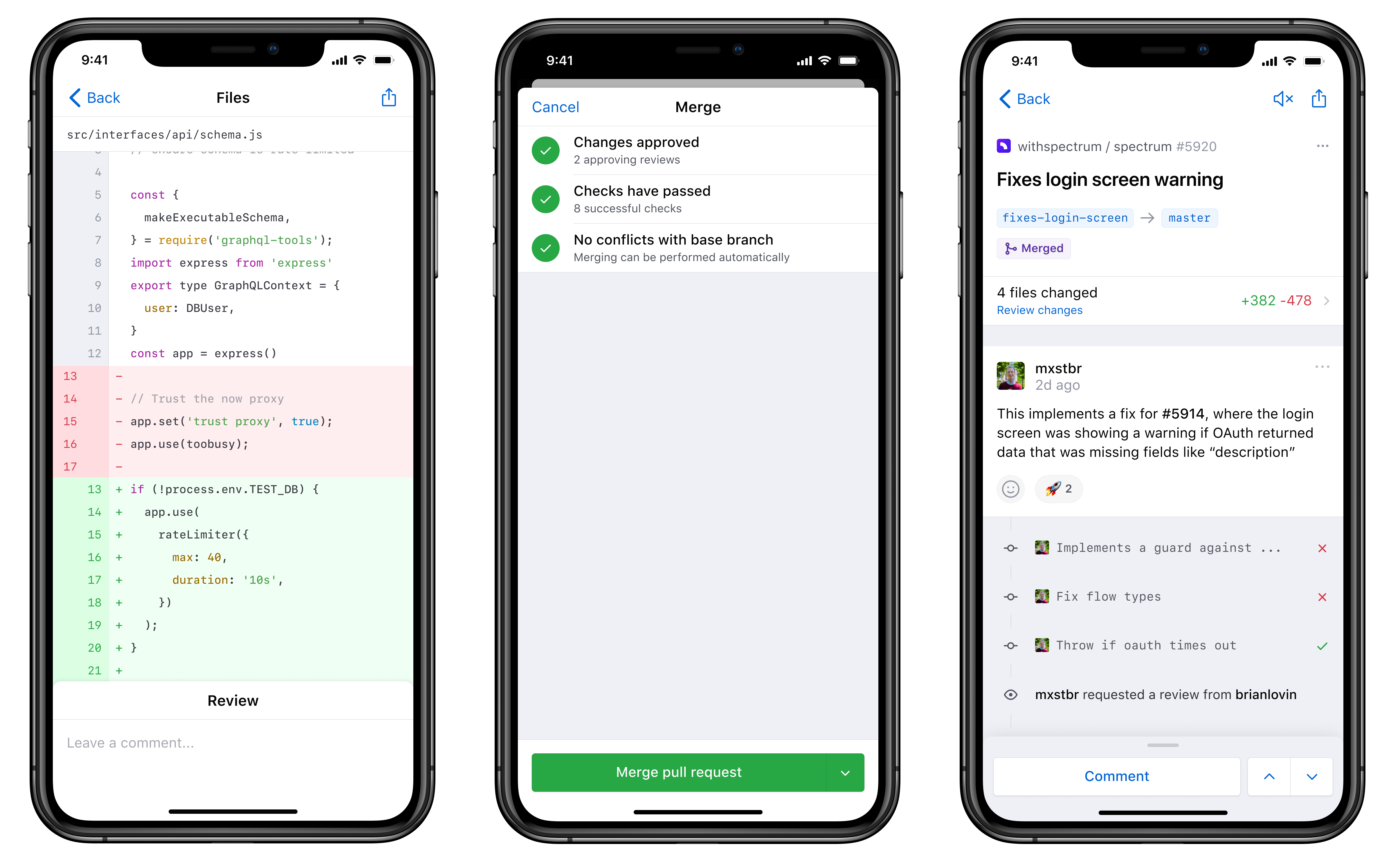
As a native app, GitHub for mobile automatically adapts to every screen size, even in dark mode based on your device preferences.

GitHub for mobile is available now in beta for iOS—and coming soon for Android.
Learn more about GitHub for mobile
Notifications (limited beta)
Notifications on your favorite projects can be overwhelming, filling your inbox with messages, and making it hard to separate signal from noise. Over the past year we shipped release-only notifications, mark as read, gist notifications, and other ways to improve how you collaborate with teams. Now, rather than pushing notification emails to your inbox, we’ve brought an inbox experience into GitHub to help you filter through and act on the work that is most important to you and your team. You can spend less time sorting through the noise and focus on getting the right work done. Step away from your screen, view streamlined notifications on mobile, and come back to an experience that’s customized for the way you work.
Triage, respond, and clear out your notifications inbox.
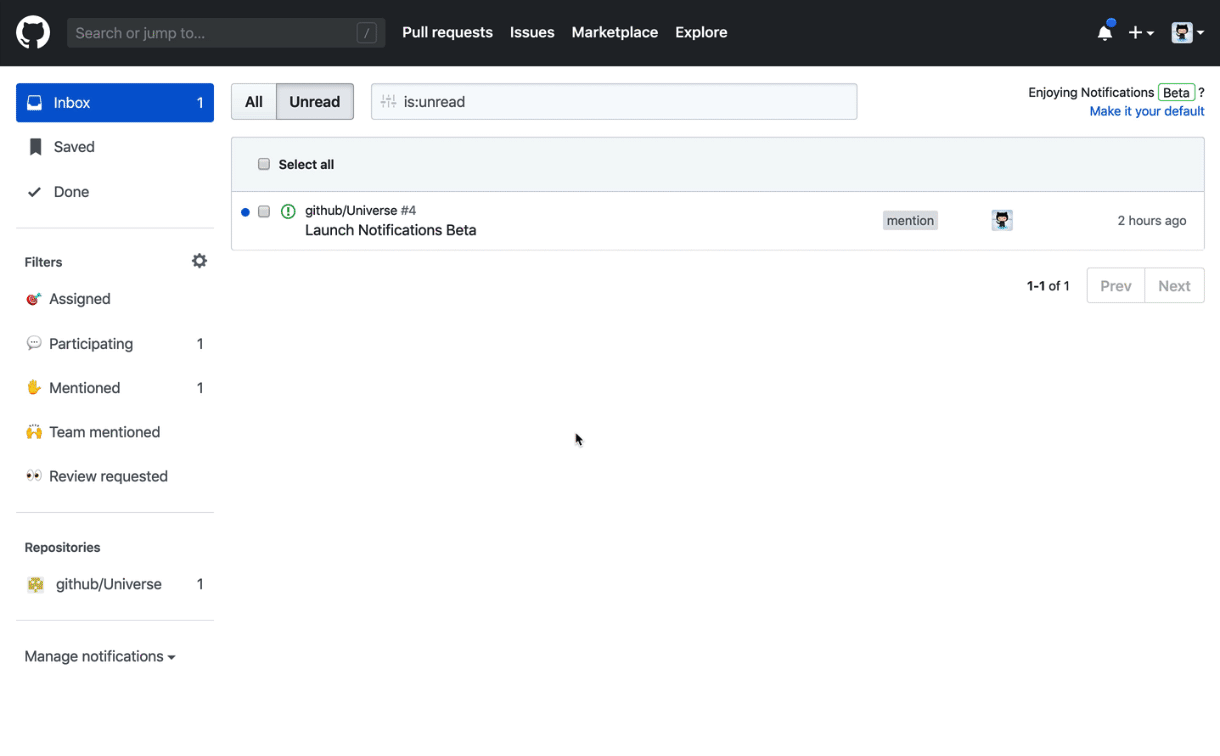
Set up custom filters to find what’s most important. And unblock your team with a default filter for requested reviews.

We designed the web and mobile experiences to work together seamlessly. As of today, all users of the GitHub for mobile beta will receive early access to the notifications beta for the best possible experience, with gradual rollout to all GitHub.com users over the next few months.
Code navigation
As part of improving your daily experience, we’re introducing more ways to navigate your code on GitHub. Code navigation consists of two features: jump to definition and find all references. Hovering over function and method calls will expose jump-to-definition links and references by line number for all call sites in the blob content within the same repository. We rely on the semantic library to find definitions and call sites in your code.
Code navigation was released in limited public beta for select repositories earlier this year. Today we’re making it available for all Ruby, Python, and Go repositories on GitHub, with more languages coming soon. View the code tab on any public or private repository for the supported languages to try it out.
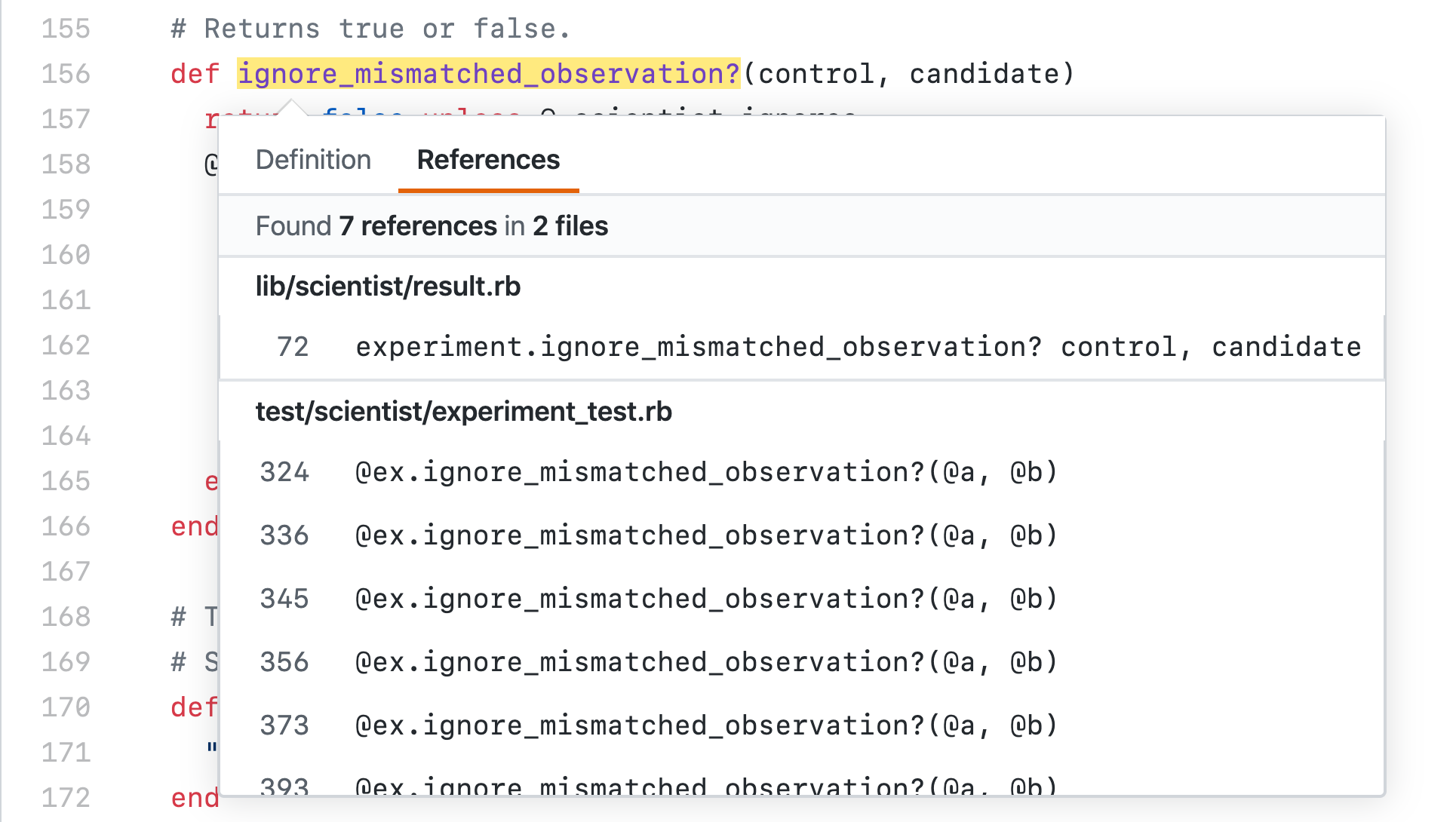
Code search (limited beta)
We heard you loud and clear—code search is an essential tool for development. Traditional approaches to search do not meet the needs of code due to case sensitivity, special characters, tokenization, and other factors specific to code. Over the next several months, we’re introducing a new search experience that provides the exact results you expect when you search code in your repository. We’ll match special characters and casing, too.
Get early access to our exact-match search functionality for select open source repositories with our beta.
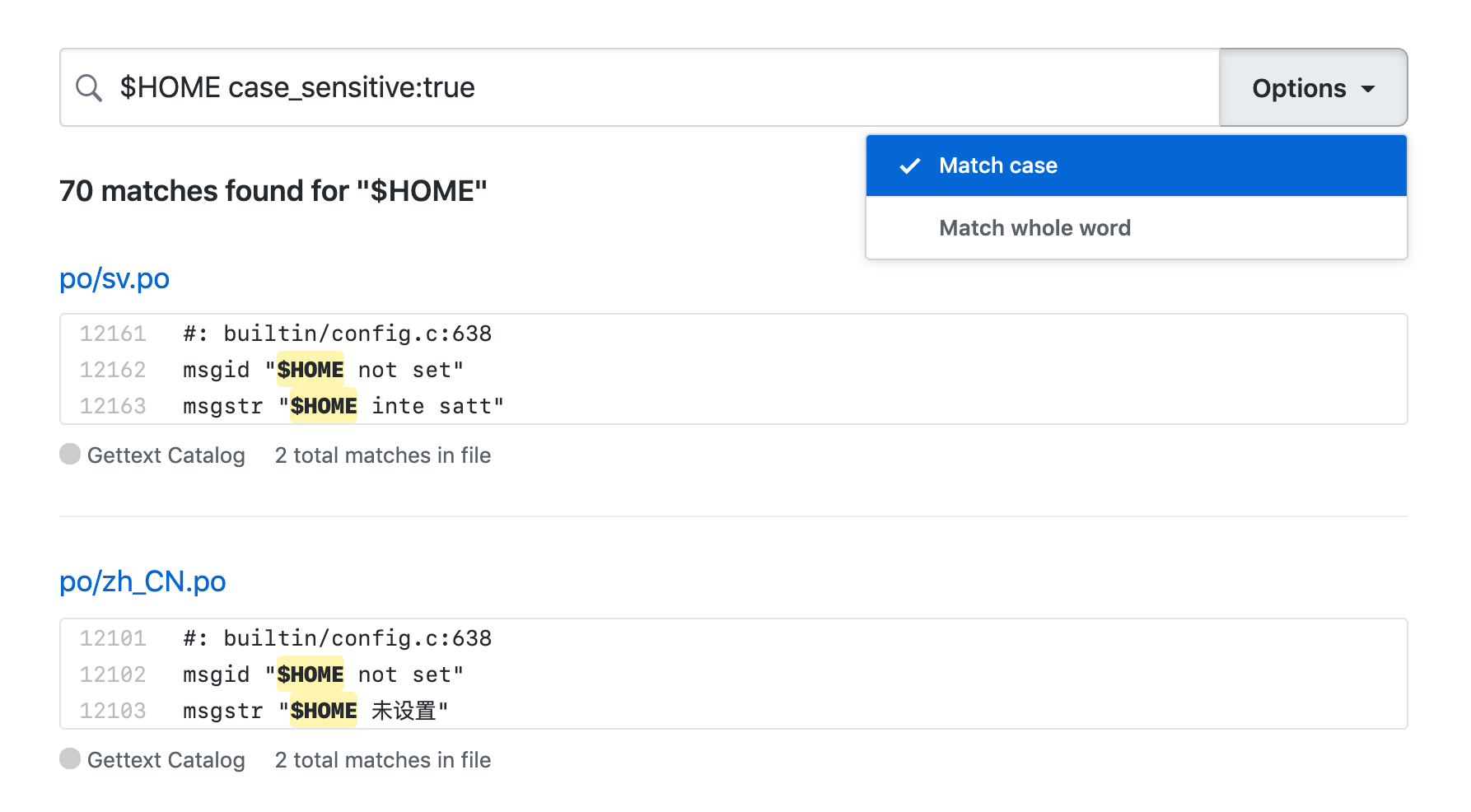
Code review assignment (beta)
When you request a team’s review on a pull request, you can now specify how many members of the team need to add their review, and code review assignment will assign them directly. This takes the burden off any single contributor and helps distribute workload evenly across your team. We’re launching with two options for distributing work across the team: round robin and load balance.
Code review assignment is available as public beta for all users who are members of an organization.
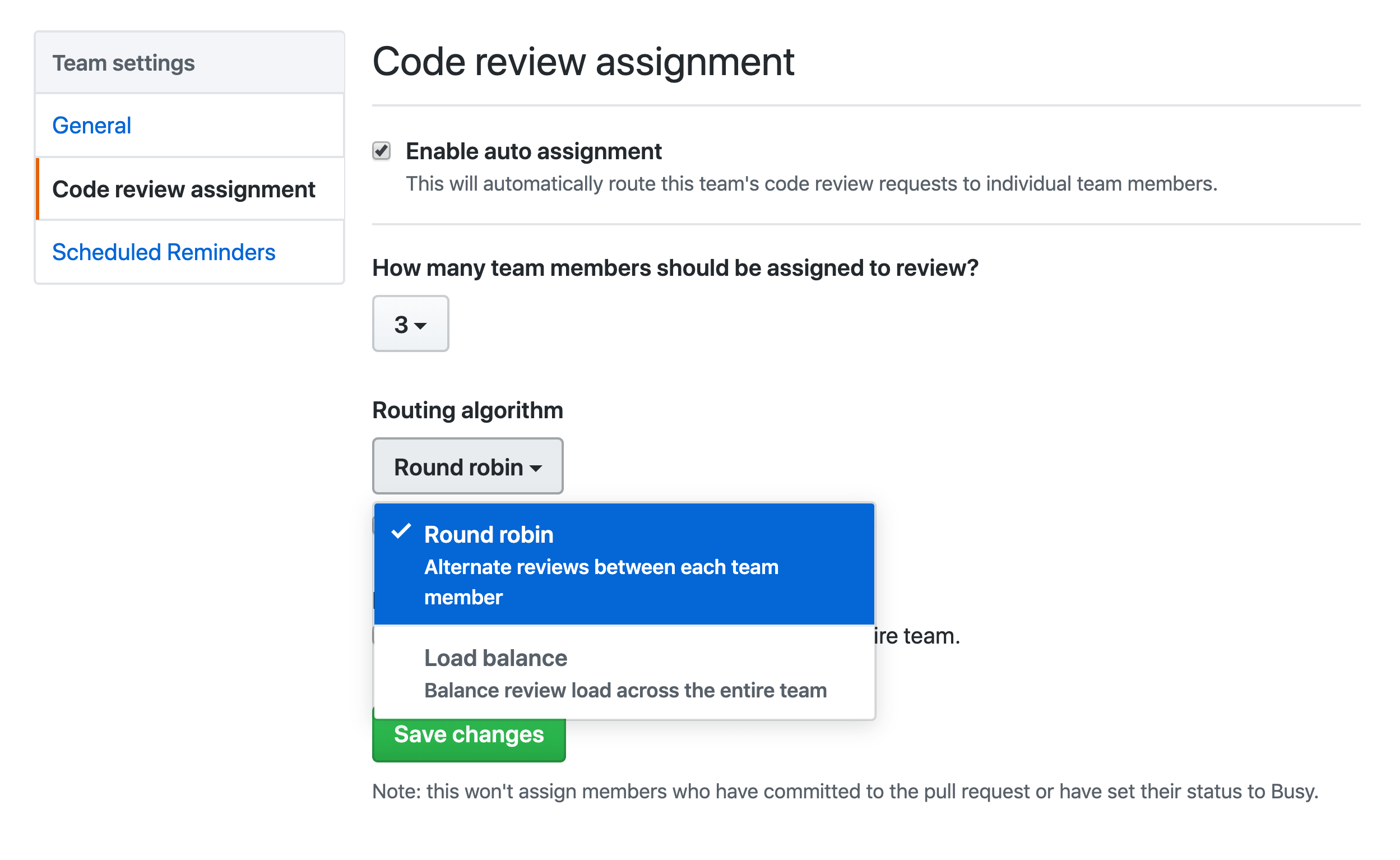
Scheduled reminders (limited beta)
Keep your projects moving with scheduled reminders. You can send Slack notifications for pending code reviews to the channel of your choice. Any admin or maintainer of a team can set them up for their team. Scheduled reminders are currently available in limited public beta and will be made generally available over the next few months.
Learn more about scheduled reminders
Feature preview
Feature preview is a new way for you to participate in pre-release features on GitHub. As we roll out features like notifications, you can now opt in to beta features so you have the opportunity to share feedback with us throughout the rollout process. Over the next few months you’ll see the notifications beta and other features become available for you in feature preview.
You can access feature preview today through the user settings dropdown. We’re adding pre-release features on a regular basis—chances are, you’ll find a new feature to try out.

Secure your public repositories for a thousand years
What will software look like 1,000 years from now? What will humanity look like? We can only guess. But we can help make sure that today’s most important building blocks make it to tomorrow. Our world is powered by open source software. It’s a hidden cornerstone of our civilization, and the shared heritage of all humanity. The mission of the GitHub Archive Program is to preserve it for generations to come.
We’re partnering with the Stanford Libraries, the Long Now Foundation, the Internet Archive, the Software Heritage Foundation, Piql, Microsoft Research, and the Bodleian Library to preserve the world’s open source code. We’ll protect this knowledge by storing multiple copies across various data formats and locations, including a very-long-term archive designed to last at least 1,000 years called the GitHub Arctic Code Vault.
Learn more about the GitHub Archive Program
Support more open source projects with GitHub Sponsors
Open source projects can now receive funding through GitHub Sponsors. When we launched GitHub Sponsors in May, there was an outpouring of enthusiasm for funding open source. We also received lots of great feedback, with one consistent theme in particular: the community wants a way to fund people behind projects too. So starting today, open source projects can receive funding through GitHub Sponsors!
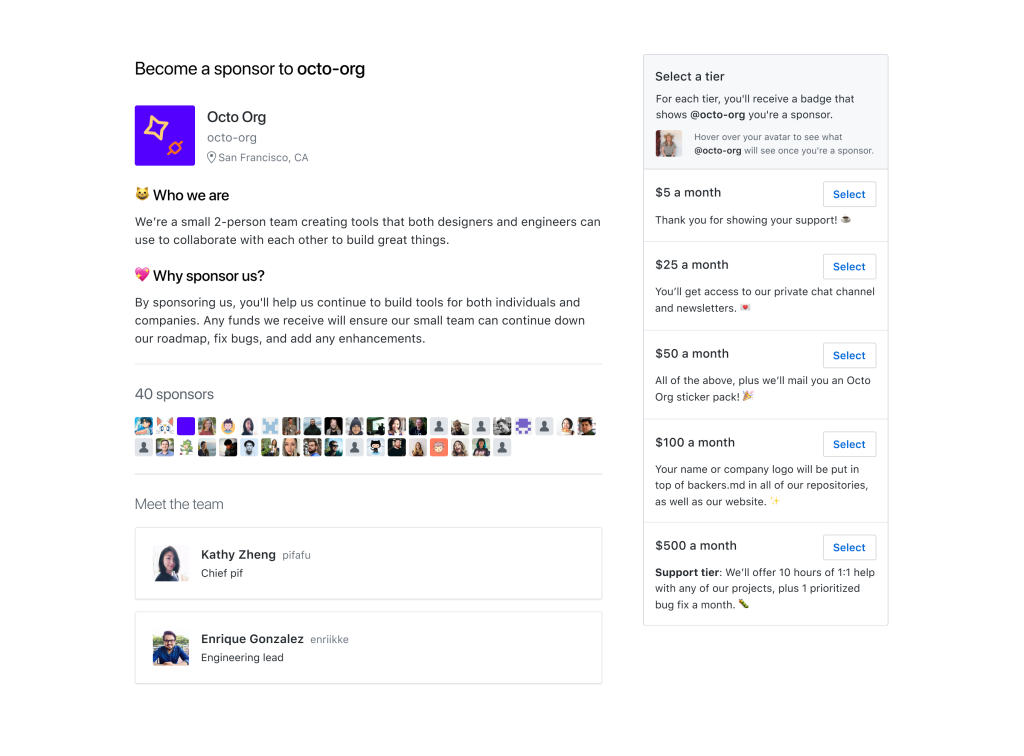
This is the natural next step for GitHub Sponsors, and it gets to the core of what open source is all about. We’re all standing on the shoulders of giants and collaborating with each other. Project-level funding reflects the deeply collaborative way open source is made.
We’re also keeping in mind that an influx of funds can raise new, unanticipated challenges for a team, so we’re taking extra care in our early stages to encourage transparency and share insights with contributors on how funding decisions are made.
This is still just the beginning. We’re committed to helping the community fund developers who work in open source, and we’re excited to keep building new ways to make that happen.
Are you part of an open source team that has a corporate or non-profit entity and bank account? Sign up for the waitlist
Get the latest GitHub Enterprise Server release
From automated workflows to working with the world’s largest open source community, there are many reasons over half of the Fortune 500 love using GitHub Enterprise. Our latest Enterprise Server release includes updates to community and project management, developer productivity, and new security features that make GitHub the safest place to build software.
Learn more about Enterprise Server 2.19
See what else launched
Tags:
Written by
Related posts

GitHub availability report: January 2026
In January, we experienced two incidents that resulted in degraded performance across GitHub services.

Pick your agent: Use Claude and Codex on Agent HQ
Claude by Anthropic and OpenAI Codex are now available in public preview on GitHub and VS Code with a Copilot Pro+ or Copilot Enterprise subscription. Here’s what you need to know and how to get started today.

What the fastest-growing tools reveal about how software is being built
What languages are growing fastest, and why? What about the projects that people are interested in the most? Where are new developers cutting their teeth? Let’s take a look at Octoverse data to find out.